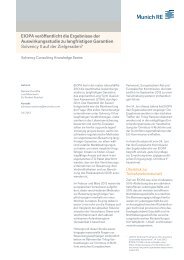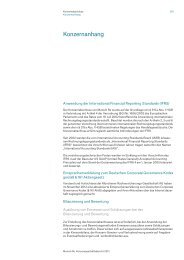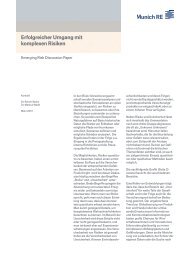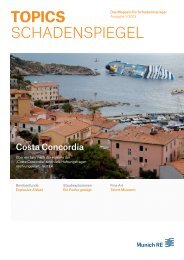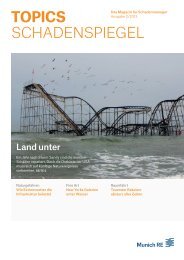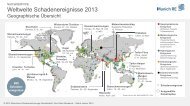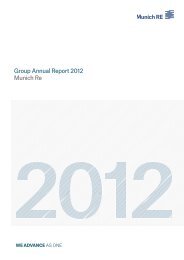Munich Re Group Annual Report 2006 (PDF, 1.8
Munich Re Group Annual Report 2006 (PDF, 1.8
Munich Re Group Annual Report 2006 (PDF, 1.8
You also want an ePaper? Increase the reach of your titles
YUMPU automatically turns print PDFs into web optimized ePapers that Google loves.
<strong>Munich</strong> <strong>Re</strong> <strong>Group</strong> <strong>Annual</strong> <strong>Re</strong>port <strong>2006</strong> Management report_Corporate governance report<br />
tially controversial aspects are rendered transparent for<br />
the Supervisory Board’s Personnel Committee.<br />
Medium- and long-term compensation component –<br />
Medium-term bonus<br />
The medium-term bonus is based on performance over a<br />
three-year period. It is measured on the basis of the <strong>Group</strong><br />
result category from the short-term compensation component.<br />
Payments are made only if the achievement rate is<br />
at least 50% on average for the three-year period.<br />
Share-price-based compensation component –<br />
Long-term incentive plan<br />
This remuneration component, with a long-term perspective,<br />
is linked to the sustained appreciation of <strong>Munich</strong> <strong>Re</strong>’s<br />
share price. The long-term incentive plan is set up each<br />
year, and the participants receive a certain number of stock<br />
appreciation rights. These can only be exercised if, after a<br />
two-year vesting period, <strong>Munich</strong> <strong>Re</strong>’s share price has risen<br />
by at least 20% since inception of the plan and the shares<br />
have outperformed the EURO STOXX 50 at least twice at<br />
the end of a three-month period during the term of the<br />
plan. The exercise hurdles are exacting and in keeping with<br />
the German Corporate Governance Code.<br />
Whether the stock appreciation rights can be exercised<br />
and, if so, when, is not certain at the time they are granted.<br />
The exercising and proceeds depend on the development<br />
of the share price and the exercise price and date. The<br />
amount of income is limited. Up to now, it has only been<br />
possible to exercise stock appreciation rights under the<br />
plans set up in 1999, 2003 and 2004. Further information on<br />
the long-term incentive plans can be found on pages 207 to<br />
209 of the notes to the financial statements.<br />
In the case of 100% achievement of objectives (annual<br />
bonus, medium-term bonus) and based on the imputed<br />
value of the share-price-linked compensation (long-term<br />
incentive plan) at the granting date, the weightings of the<br />
individual components in terms of total remuneration are<br />
as follows: basic remuneration approximately 25%, annual<br />
bonus approximately 35%, medium-term bonus approximately<br />
20%, and long-term incentive plan approximately<br />
20%. <strong>Annual</strong> bonus, medium-term bonus and long-term<br />
incentive plan together form a well-balanced incentive<br />
system.<br />
In accordance with the recommendations of the<br />
German Corporate Governance Code, the monetary<br />
remuneration of the Board members thus comprises fixed<br />
and variable components, all of which are appropriate in<br />
themselves and as a whole. Criteria for this are in particular<br />
the respective Board member’s duties, the Board member’s<br />
personal performance, the performance of the Board as a<br />
whole and the financial situation, performance and future<br />
prospects of <strong>Munich</strong> <strong>Re</strong>, taking into account the relevant<br />
benchmarks.<br />
A different arrangement applies to the remuneration<br />
structure of Mr. Phelan, who is not only a member of the<br />
Board of Management but also the President, Chief Executive<br />
Officer and Chairman of the Board of <strong>Munich</strong> <strong>Re</strong> America<br />
Corporation. He therefore has special remuneration<br />
agreements, with the major portion of his income derived<br />
from the USA.<br />
Other remuneration<br />
In the case of seats held on other boards, remuneration for<br />
board memberships must be paid over to the Company or<br />
is deducted in the course of regular compensation computation.<br />
Excepted from this is remuneration for personal<br />
memberships, which do not exist at present. In the event<br />
of a change of control, the members of the Board of Management<br />
have no contractual entitlement to payments. As<br />
far as the share-price-based remuneration is concerned,<br />
the conditions provide for special exercise options in the<br />
case of a change of control. Details of this are provided<br />
in the notes to the consolidated financial statements on<br />
page 209.<br />
Pension entitlement<br />
In addition to the regular remuneration, the members<br />
of the Board of Management are members of a defined<br />
benefit plan under which they will receive a fixed pension<br />
whose amount depends on their basic remuneration and<br />
their years of service on the Board. The pension level starts<br />
at 30% and can reach a maximum of 60% of annual basic<br />
remuneration. Members of the Board of Management are<br />
entitled to an occupational pension from age 60 if they<br />
leave the active service of the Company, or if their contract<br />
of employment is terminated prematurely or not extended<br />
due to incapacity for work or under certain other conditions.<br />
Total remuneration of the Board of Management<br />
In the year under review, after allocation to the appropriate<br />
periods, the remuneration of <strong>Munich</strong> <strong>Re</strong>insurance Company’s<br />
Board of Management for the performance of its<br />
duties in respect of the parent and subsidiaries showed an<br />
overall rise of €4.4m or 20.8% from €21.2m to €25.6m. The<br />
115



